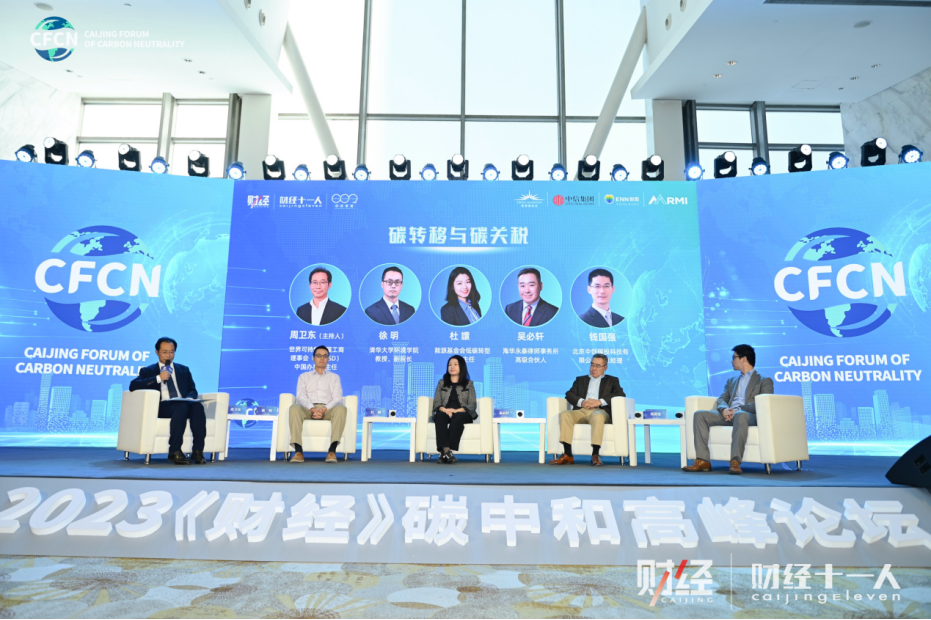The world's first "carbon tariff" trial operation How challenging are Chinese companies?
On October 20, the "2023 Caijing Carbon Neutrality Summit Forum and Carbon Emission Ranking of Chinese Listed Companies" was held in Beijing.
On October 1 this year, the world's first "carbon tariff", the EU Carbon Border Adjustment Mechanism (CBAM), began trial operation, with a transition period until December 31, 2025, and officially starting on January 1, 2026, and fully implemented by 2034.
"The biggest significance of CBAM (EU Carbon Border Adjustment Mechanism) is to remind the world." Wu Bixuan, a senior partner at Hiways (Beijing) Law Firm, said at the roundtable that in the past, people used to regard carbon tariffs as cost factors such as competition and trade, and compared with the level of price, low-carbon factors or sustainable factors will be added in the future.
The reporter of "Daily Economic News" noted at the scene that after the CBAM officially took effect, the participants put forward different views on the impact of the domestic industry and the future development based on different perspectives.

Image source: Courtesy of the organizer
China needs a sound carbon market and carbon price system
"CBAM is to help the EU achieve its overall goal of carbon neutrality or climate neutrality. In line with the tightening of the carbon market, CBAM has raised costs for companies in the EU, and in order to be fair, it has also imposed relevant requirements on importers. Du Zhen, director of the Low Carbon Transition Program at Energy Foundation China, explained.
In an interview with the "Daily Economic News" reporter after the meeting, Du Zhen pointed out that "carbon tariffs are a mechanism design to avoid carbon leakage or carbon transfer, because the intensity of carbon control between countries is different from the entire economy", and the release of CBAM was not intended as a barrier, but to allow manufacturers exporting to the EU and manufacturers in the EU to stand on the same starting line on the basis of carbon costs.
Du Zhen believes that China first needs a relatively complete carbon market and carbon price system, which may have a more solid foundation for negotiations with the EU.
"CBAM currently has a relevant impact on six industries: steel, cement, aluminum, fertilizer, electricity and hydrogen. Steel accounts for about 70% of China's total exports to Europe and is the most affected of the six industries. Du said at the forum that from now until 2034, the impact of CBAM will expand to air transportation, road transportation, construction and energy conservation.
According to Du Zhen, steel, cement and aluminum are industries that are exported domestically but not covered by the national carbon market, and the key place in the next step of the carbon market work is to expand the capacity of these industries.
Some participants also raised concerns about the route of expanding the carbon market and raising the carbon price, "Can it solve the problem after putting it in?" Now (the price per ton of carbon) is 80 yuan, really want to get 80 euros, 90 euros, the days are over? ”
China's industry needs to change from a respondent to a question-taker
What adjustments and adaptations are needed in the Chinese market? Qian Guoqiang, deputy general manager of China Innovation Carbon Investment Technology Co., Ltd., believes that there are no leading enterprises in China that can really formulate rules for product terminal procurement. In this international trade and technology competition, China's industries and enterprises are in the position of answerers. Only when the Chinese industry is at the top of the entire industrial division of labor can it define the market and become the question-maker. Apple, for example, could demand that all supply chains be carbon neutral by 2030.
"In the short term, China is a manufacturing country, and even if the products produced are not exported, the rules are still not set by us according to the carbon footprint, which is a big reality." Qian Guoqiang said.
In addition, the question of corporate research was also mentioned by many guests.
"The biggest challenge for the future development of the green mechanism is the need to reach a consensus on relevant policies in China. Relevant cooperation needs to go out and investigate export enterprises on the spot to understand the real situation. Qian Guoqiang said that at present, there is a lack of research in China to really go out to understand first-line enterprises.
"In the carbon market, sectors other than the electricity sector involve indirect emissions. Many of the problems that come with indirect emissions are borne by companies. In the decision-making process, in the face of practical problems such as the demand for dual carbon, the development of renewable energy and the need for energy conservation and emission reduction, we hope to promote communication through some effective ways. Du also emphasized the importance of research and communication.







